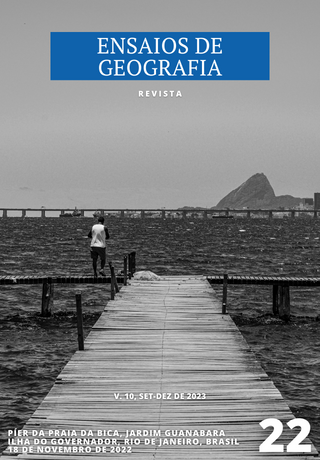REAL ESTATE TAXATION AND ITS OMISSIONS IN URBAN POLIC
a case study of the Functional Metropolitan Region of Natal
DOI:
https://doi.org/10.22409/eg.v10i22.58947Keywords:
Real Estate Taxation, Urban Policy, Metropolitan Region of NatalAbstract
This study analyzes real estate taxation from the perspective of capturing urban land value increments and the lack of effectiveness of the instruments provided in urban legislation. Additionally, it aims to investigate the relationship between the collection of property taxes (IPTU and ITBI) and investment in urban infrastructure, which has the potential to enhance urban land value. The chosen spatial scope is the functional Metropolitan Region of Natal, comprised of the municipalities of Natal, Parnamirim, São Gonçalo do Amarante, Macaíba, and Extremoz. These municipalities experience significant real estate dynamics and are undergoing urban expansion, yet they lack urban planning that aligns with municipal tax management and enables a more equitable distribution of the benefits derived from this revenue. In this regard, it reflects on the capacity to address the historical challenges that cities face in capturing resources for public investments in urban infrastructure. Finally, the study sought to understand how real estate taxation can be utilized to finance urban development, contributing to the perspective of the Right to the City through the lens of urban justice, integrated with the capacity for investment and financing of cities through established taxes on private property, which also serve non-fiscal purposes.
Downloads
References
BONDUKI, N. A luta pela reforma urbana no Brasil: do Seminário de Habitação e Reforma Urbana ao Plano Diretor de São Paulo. São Paulo: Instituto Casa da Cidade, 2018. 267p.
BRASIL. Estatuto da Cidade. Brasília, DF: Presidência da República, 2001. Disponível em: <http://www.planalto.gov.br/ccivil_03/leis/leis_2001/l10257.htm>. Acesso em: 15 ago. 2022.
CAVÉ, J; KALFON, M; ALBRECHT, D; MICHELON, B; DAVID, L; GALLY, J. O financiamento da cidade latino-americana: instrumentos a serviço de um desenvolvimento urbano sustentável. 2014. Disponível em: <https://www.ipea.gov.br/portal/images/stories/PDFs/livros/livros/livro_financiamento_cidades.pdf>. Acesso em: 04 jul. 2022.
CARVALHO JÚNIOR, P. H. B. A administração tributária do IPTU e seu impacto na efetivação do Estatuto da Cidade. In: COSTA, Marco Aurélio (org.). O Estatuto da Cidade e a Habitat III: um balanço de quinze anos da política urbana no Brasil e a nova agenda urbana. Brasília: Ipea, 2016.
CONFERÊNCIA POPULAR PELO DIREITO À CIDADE. Plataforma de lutas pelo direito à cidade. São Paulo, 2022. Disponível em: <https://www.confpopdireitoacidade.com.br/_files/ugd/b74794_b6ba03e3c3eb45c49d9c7a1df9b76c77.pdf>. Acesso em: 05 jul. 2022.
CLEMENTINO, M. L.; FERREIRA, A. (Org.). Natal: transformações na ordem urbana. Rio de Janeiro: Letra Capital, 2015. 430p.
CLEMENTINO, M. L. M; SILVA, B. C. N; ALMEIDA, L. S. B; SILVEIRA, R. M. C. Duas décadas da Região Metropolitana de Natal: estudo da governança metropolitana a partir da elaboração dos Planos Plurianuais municipais. In: CLEMENTINO, M. L. M. Duas décadas da Região Metropolitana de Natal. Rio de Janeiro: Letra Capital, 2019, pp, 21-51.
DE CESARE, C. M. Condições básicas para garantir a funcionalidade da tributação recorrente ao patrimônio imobiliário urbano e rural. Texto para discussão. Reforma Tributária 23. 2018. Disponível em: <https://plataformapoliticasocial.com.br/condicoes-basicas-para-garantir-a-funcionalidade-da-tributacao-recorrente-ao-patrimonio-imobiliario-urbano-e-rural/>. Acesso em: 30 fev 2023.
FERNANDES, C. E. O mínimo essencial da gestão urbana territorial em face da cidade constitucional. 2016. 267f. Tese (Doutorado em Gestão Urbana) – Pontifícia Universidade Católica do Paraná, Curitiba, 2016.
GOMES, R, C, C; ALVES, L. S. F; DANTAS, J. R. Q; FRANÇA, R. S. de. A metrópole de Natal na rede urbana brasileira e sua configuração interna. In: CLEMENTINO, Maria do Livramento Miranda; FERREIRA, A. L. Natal: transformações na ordem urbana. Rio de Janeiro: Letra Capital, 2015, pp. 45-82.
INSTITUTO BRASILEIRO DE GEOGRAFIA E ESTATÍSTICA (IBGE). Base de informações da área de unidade territorial. 2020. Disponível em: <https://cidades.ibge.gov.br/>. Acesso em: 25 nov 2022.
LEFEBVRE, H. O direito à cidade. São Paulo: Centauro, 2001. 146p.
MARICATO, E. Reforma Urbana: Limites e Possibilidades: Uma trajetória Incompleta. In: RIBEIRO, L. C. Q.; SANTOS JÚNIOR, O. A. (org.). Globalização, fragmentação e reforma urbana: o futuro das cidades brasileiras na crise. 2ª ed. Rio de Janeiro, Letra Capital, 2015. p. 309-326.
RIBEIRO, L. C. Q. O município e a Reforma Urbana: Os desafios da política urbana redistributiva. In: Proposta: Crise Urbana. Rio de Janeiro, FASE, 1994, p. 5-13.
RIBEIRO, L. C. Q. A metrópole em questão: desafios da transição urbana. Rio de Janeiro, Letra Capital, 2018. 313p.
SANTOS, A. M. S. P. Política urbana no contexto federativo brasileiro: aspectos institucionais e financeiros. Rio de Janeiro: EDUERJ, 2017. 288p.
SMOLKA, M. O; AMBORSKI, D. Value capture for Urban Development: An Inter-American Comparison. In. Work Papers. (2020). Lincoln Institute of Land Policy Disponível em: <https://www.lincolninst.edu/sites/default/files/pubfiles/1279_Smolka%20Final.pdf>. Acesso em: 08 fev. 2023.
SMOLKA, M. Implementing Value Capture in Latin America: Policies and Tools for Urban Development. In: Policy Focus Report. Cambridge, MA: Lincoln Institute Land Policy. (2013). Disponível em: <https://www.lincolninst.edu/sites/default/files/pubfiles/implementing-value-capture-in-latin-america-full_1.pdf>. Acesso em: 08 set. 2022.
Published
How to Cite
Issue
Section
License
Copyright (c) 2023 Da Revista (Ensaios de Geografia) e do Autor

This work is licensed under a Creative Commons Attribution 4.0 International License.
CC BY Attribution. Others may distribute, remix, transform, and build upon the material for any purpose, even commercially, provided they give the author and licensor the credits.


